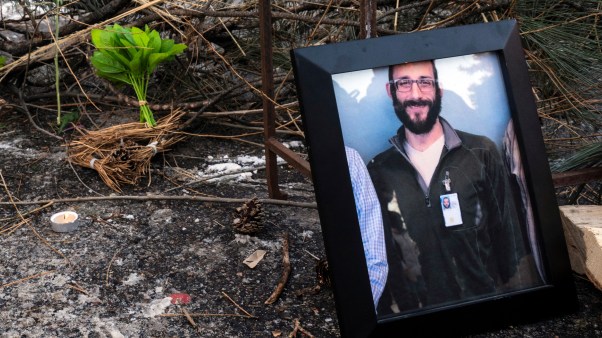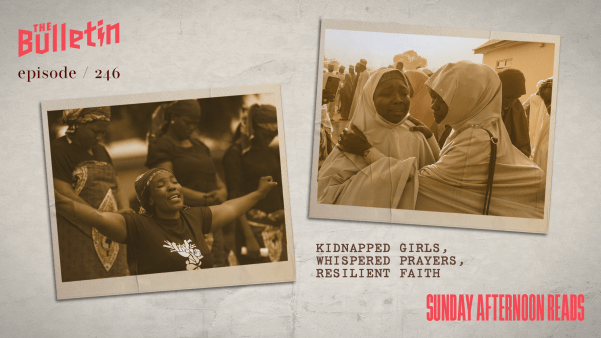On a recent trip back from South Africa, I was warmly greeted in the Chicago airport by a US customs official with the words “welcome home.” He didn’t know the weight of those words for me, an American citizen by birthright who has had a complicated relationship with my nationality—complications made freshly relevant in light of President Donald Trump’s efforts to undo citizenships like mine.
Last week, federal judge Joseph LaPlante continued the judicial branch’s struggle with the Trump administration when he blocked the executive order that would have denied citizenship to children born to immigrant parents in the US. In a hearing before his ruling, Judge LaPlante declared that such citizenship is “the greatest privilege that exists in the world.”
While I acknowledge the nobility of such a statement, I confess that the benefits of that privilege didn’t always feel so apparent to me as a child growing up in Midwest America.
I was a US citizen on paper, yet people repeatedly assumed that I’d just immigrated from another country. I would sing, “I’m proud to be an American,” during school choir, and then hours later in a McDonald’s parking lot, a white man would drive by with a roar of his engine and yell at me and my family, “Go back to China!”
When I moved school districts in 7th grade, I was automatically placed in ESL class based on my Korean name. Reading and writing (in English) had always been my strongest subjects. Why did that need explaining? At the same time, Korean-born acquaintances called me a Twinkie: yellow on the outside, white on the inside.
Unable to fully identify as either Korean or American, I instantly connected with Paul’s words in Philippians 3 the first time I read them: “Our citizenship is in heaven” (v. 20). Paul, a Hebrew of Hebrews, a Benjamite, a Pharisee, a Roman citizen—who could claim every kind of national belonging to his favor—chose to forsake it all in view of his heavenward call.
It seemed like the perfect way to avoid my own identity angst, so for many years, I took my birthright citizenship for granted. I didn’t care to read the news, snored through American history, and when I turned 18, quietly decided not to vote alongside my peers. What was earthly citizenship, anyway? I counted it all as dross and pressed hard into my identity as a Christian.
But I was wrong. History and the Bible have since taught me that citizenship is nothing to scoff at. Like all other gifts in life, it is to be used to help us obey the call to love God and neighbor. Neglecting to do so comes at a cost to the most vulnerable.
The displacement I felt as a child was not just personal. Beneath today’s birthright citizenship battles in the US is an old undercurrent: how to determine, in a nation made up almost entirely of immigrants, which immigrants belong and which do not.
Birthright citizenship is not the norm around the world. Most countries grant citizenship based on ethnicity and ancestry—by “the law of blood,” or jus sanguinis. You’re a citizen if your parents are—and in many ways, things are simpler that way. Among the 20 most developed countries, only Canada and the US grant citizenship through jus soli, or “the law of soil.”
Jus soli in the US originated from the colonial era, when European settlers born in colonies were considered “natural born” subjects of England’s king. This practice influenced how an independent America later conferred citizenship to most Europeans born in the US. Non-European immigrants (and Indigenous people) were excluded from this privilege.
That changed in 1894, when Wong Kim Ark, who was born in America and had lived most of his life there, returned to California after visiting China. He was denied reentry on grounds that his Chinese parents were ineligible for US citizenship under the Chinese Exclusion Act that throttled Asian immigration to America at the time.
In response, Wong claimed his status as a US citizen under the 14th Amendment, which had brought equal citizenship to formerly enslaved Black people. In United States v. Wong Kim Ark, the court ruled in Wong’s favor, affirming that all persons born in the US were, regardless of race, entitled to the rights of citizenship.
Wong’s case was the beginning of birthright citizenship as we know it today. Still, it was contested from the very beginning, and for many years after, did little to prevent continued discrimination against Chinese and other Asian Americans. The path to naturalized citizenship for those who were not “common-sense white” or Black did not open until 1923.
The US “has always wrestled with two strains of nationalism,” explains Gary Gerstle, a historian at the University of Cambridge. “On the one hand, ‘civic nationalism’ imagines America as a country open to everyone, regardless of faith, color or creed,” while “racial nationalism” imagines America as a place where nonwhite people “could never be accepted as full-fledged members.”
The Wong verdict was a step away from racial nationalism toward civic nationalism. Over the decades since Wong’s case, the US pivoted, however slowly, to become a multiracial democracy. “The absorption of millions of immigrants was part of what made the new superpower unique, then and now,” says Marcela Valdes in The New York Times.
Yet racial nationalism never fully went away. Birthright citizenship has been debated since long before Trump’s first presidency. It’s raised difficult questions, like what to do with “birth tourism” or children born to parents who are in the US illegally. Above all, it’s concerned with a key question: In a diverse democracy, who is truly a citizen and who is an “alien”?
Christians of all nationalities know we are both heavenly citizens and earthly exiles. “Live out your time as foreigners here in reverent fear,” writes the apostle Peter (1 Pet. 1:17), and the writer of Hebrews calls people of faith “foreigners and strangers on earth” who are “looking for a country of their own” (11:13, 14). It would be easy to conclude, then, that our earthly citizenship doesn’t matter. But a closer look at Paul’s relationship with his Hebrew and Roman identities shows a more complicated picture.
Paul denounces his elite Hebrew status in Philippians 3, but in Romans 9, he expresses “great sorrow and unceasing anguish” (v. 2) over the unbelief of his people, “those of my own race” (v. 3). His citizenship is in heaven, but he unabashedly exercises his Roman rights when he and Silas are unjustly imprisoned (Acts 16:37–39). In Acts 22, when Paul is stretched out to be flogged, he turns to the centurion and says, “Is it legal for you to flog a Roman citizen who hasn’t even been found guilty?” (v. 25). The commander and his guards withdraw; the law of Rome rises to protect Paul.
Rather than letting his love for Rome or Israel take precedence in his identity, Paul uses these earthly nationalities in service to the kingdom. He repeatedly pushes the limits of his Roman citizenship to shield his colleagues and preach before audiences as diverse as the Sanhedrin and sailors (Acts 23; 27). His example challenges me to likewise use my rights as an American citizen to voice concern on behalf of the most vulnerable.
The US Conference of Catholic Bishops recently wrote in a statement that the repeal of birthright citizenship “would render innocent children stateless, depriving them of the ability to thrive in their communities and reach their full potential.” The repeal of birthright citizenship would “create a permanent underclass in U.S. society, contravening U.S. democratic tradition,” the statement continues, “undermining the human dignity of innocent children who would be punished though they did nothing wrong.”
What’s most concerning today is that even those who did everything right are not safe. The Trump administration’s focus on ridding the country of illegal immigrants has also targeted legal refugees and asylum seekers, professionals, and students (as my parents once were). Immigrants in America today are truly in danger of becoming stateless, punished without doing anything wrong. Many being deported are Christians, some fleeing persecution from countries like Iran.
Those of us who are Christian—and who wish to see our nation guided by our faith—should be especially concerned about all this, especially when many of our fellow citizens now see diversity as a danger to American culture.
A primary arc of Scripture is that our heavenly citizenship extends to people from every nation, tribe, tongue, and class (Rev. 7:9; Gal. 3:28). “Christianity has been a multicultural, multiracial, multiethnic movement since its inception,” writes Rebecca McLaughlin. One cannot read the Bible without seeing that God cares deeply about injustice toward the foreigner, the poor, and the oppressed (Isa. 58:6–7; Matt. 25:35–40). American Christians who disagree with this kind of vision may be sorely disappointed if the country were to become a truly Christian nation.
“The promise of Christ’s return does not demand quietism or political escapism,” writes Kaitlyn Schiess. “Rather, it should prompt faithful political work that can resist the impulse toward violence and injustice.” When our earthly citizenship is rightly lived out in service to our heavenly one, we can live more fully into our calling to love God and neighbor. It’s a calling that others have lived out for me.
I, as an American Christian, can thus harness the protection of the First Amendment to speak out against the troubling turn toward racial nationalism of late—the confirmation of all my worst suspicions as a child. As what was spoken in United States v. Wong Kim Ark is being undone, my prayers may look like weeping, my love like joining a march with arms linked. But all this would be an expression of what it means to be both a faithful citizen of the US and a faithful citizen of the kingdom to come.
Birthright citizenship did not wholly take away my feelings of statelessness or lift me from being perceived as somehow less than American. But I grew up in a time when all these feelings and experiences fell to shambles at the hard, legal truth of my passport. Though there was always anxiety each time my parents applied for a new visa, we weren’t separated or deported. We didn’t fear them being snatched off the streets by immigration officers in plain clothes.
America wasn’t perfect then, and it isn’t perfect now. But in my day-to-day life, I had friends who rallied around me, who loved me for my whole person, and who spoke up on my behalf. I had mentors and teachers who prayed with me, encouraged me, and enfolded me with a sense of belonging.
I know there are still Christians like this in America. I’m blessed to call them my friends. Both my earthly and my heavenly citizenships demand that I now be that kind of person for others too.
Sara Kyoungah White is an editor at Christianity Today.














